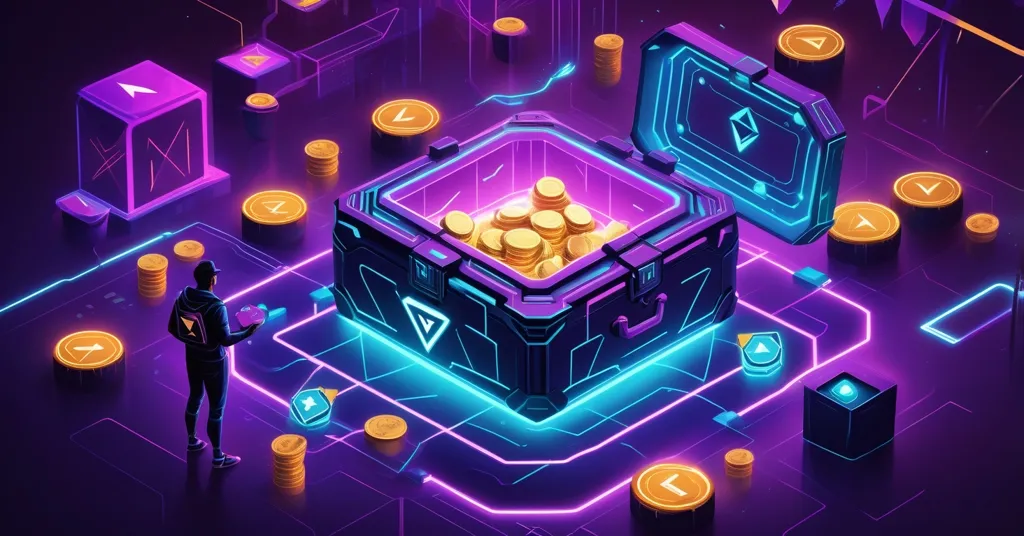GameSquare’s $100M Ethereum Bet: Bold Move or Risky Gamble for Gaming Finance?

GameSquare’s $100 Million Ethereum Gamble: A Bold Play for the Future of Finance
GameSquare, a Nasdaq-listed gaming and media company, has made headlines with a daring decision to allocate up to $100 million of its treasury into Ethereum (ETH), marking one of the most audacious corporate dives into decentralized finance (DeFi) yet. This move isn’t just a financial pivot—it’s a statement about where the future of money and gaming might be headed, and it’s already sent shockwaves through the market with a 58.76% stock surge.
- Major Bet: Up to $100 million in Ethereum, starting with an $8 million public offering.
- High Yields: Partnering with Dialectic for 8-14% on-chain returns via the Medici platform.
- Market Heat: Stock (GAME) up 58.76%, ETH price rises 2.69% to $2,606.26.
A Phased $100 Million Leap into Ethereum
GameSquare isn’t playing small. The company has board approval to invest a staggering $100 million into Ethereum, rolled out in phases to manage risk. The first step? An $8 million injection raised through a public offering of 8.42 million shares at $0.95 each, finalized on July 9, 2025. For those unfamiliar, Ethereum is the second-largest cryptocurrency by market cap, but it’s more than digital cash—it’s a programmable blockchain powering everything from decentralized apps to smart contracts, which are self-executing agreements coded on the network. This makes ETH a hub for innovation, especially in DeFi, where users can earn yields by lending or staking their assets. Learn more about this bold move with GameSquare’s massive Ethereum investment plan.
Why Ethereum for a gaming firm? GameSquare, known for its esports and media ventures like FaZe Clan, operates in an industry ripe for blockchain disruption. Think tokenized in-game items, player-owned economies, or secure transactions without middlemen—Ethereum’s tech could be a perfect fit. But this isn’t just about tech synergy; it’s about financial resilience. With past revenue volatility in the gaming sector, a crypto treasury could act as a buffer, generating returns to stabilize cash flow. It’s a calculated gamble, but one that could redefine how mid-cap companies handle their finances.
Teaming Up with Dialectic for Juicy DeFi Yields
GameSquare isn’t navigating this crypto frontier solo. They’ve partnered with Dialectic, a crypto investment firm, to manage their Ethereum holdings through the Medici platform. This tech leverages machine learning and risk controls to target on-chain yields of 8-14%, a far cry from the 3-4% typically earned through basic Ethereum staking. For the uninitiated, staking means locking up your ETH to help secure the network in exchange for rewards—think of it as earning interest on a savings account. But Dialectic’s higher returns likely involve more complex DeFi strategies, like lending ETH on decentralized platforms or providing liquidity to trading pairs, where users pool assets to facilitate trades and earn fees. Dive deeper into the details of GameSquare’s partnership with Dialectic.
Let’s be blunt—8-14% sounds fantastic, almost too good. In a space where protocols can collapse overnight, promising such returns is the kind of optimism that’d make a Wall Street banker snort. DeFi’s history is littered with exploits; over $3 billion was stolen in 2022 alone from hacks like the Ronin Bridge attack, where a gaming-focused blockchain lost hundreds of millions. While Dialectic’s tech aims to mitigate risk, one rogue smart contract—a piece of code running these DeFi systems—could turn GameSquare’s treasury into a cautionary tale. And what if Medici’s algorithms flop or Dialectic mismanages funds? That’s a question the boardroom better have an answer for. Check out more on these potential risks in GameSquare’s DeFi approach.
Diversification: Beyond Just Ethereum
Smartly, GameSquare isn’t putting all its chips on ETH alone. Their strategy includes exploring stablecoins—cryptocurrencies pegged to assets like the US dollar to minimize volatility—and NFTs, unique digital tokens often tied to art or gaming collectibles. This diversification aims to balance risk while chasing returns. Stablecoins, for instance, can be lent in DeFi for steady yields with less price swing than Ethereum, while NFTs could tap directly into GameSquare’s gaming audience, perhaps as in-game assets or exclusive fan rewards. It’s a hedge against ETH’s wild price swings, which have seen 20-30% drops in mere days during past bear markets.
Still, don’t kid yourself—this isn’t a safety net. Stablecoins have their own skeletons, like TerraUSD’s catastrophic depeg in 2022 that wiped out billions. And NFTs? Their value can evaporate faster than hype on a bad meme coin. Diversification spreads the risk, but in crypto, there’s no such thing as “safe.” GameSquare’s approach shows caution, but they’re still dancing on a tightrope.
Market Goes Nuts: Stock and Ethereum Surge
The market’s response to this announcement was nothing short of electric. GameSquare’s stock (GAME) skyrocketed 58.76% to $1.54, with trading volume hitting $40.31 million, pushing its market cap to $60.25 million. Ethereum itself caught a breeze, climbing 2.69% to $2,606.26 within 24 hours of the news. Sure, it’s tough to pin ETH’s bump solely on GameSquare, but the timing fuels a bullish vibe. For comparison, Bit Digital, another firm that pivoted its treasury to hold over 100,000 ETH, saw its stock jump nearly 20% on a similar play. Institutional confidence in Ethereum as a corporate asset is clearly heating up. Explore broader trends in corporate Ethereum adoption.
But let’s cut through the hype—a 58.76% stock surge is thrilling, yet crypto sentiment often inflates bubbles quicker than it builds real value. Investors might be riding a wave of FOMO, not fundamentals. If Ethereum’s price tanks or yields don’t materialize, that euphoria could flip to panic. GameSquare’s market cap is a modest $60 million; they’re not MicroStrategy with billions to weather a storm. This reaction is a double-edged sword—exciting, but dangerously frothy. See related market impacts in recent corporate crypto treasury shifts.
Justin Kenna, CEO of GameSquare, outlined the vision: “The new crypto strategy is part of a long-term plan to build financial resilience. Yield generated from Ethereum will support further ETH purchases, share buybacks, and core business reinvestment.”
Kenna’s plan is ambitious: use ETH yields to buy more ETH, repurchase shares to boost stock value, and reinvest in gaming operations. It’s a self-reinforcing cycle, and for a gaming firm, the potential is tantalizing. Imagine funding a blockchain-based game where players own their assets via Ethereum—GameSquare could pioneer a new revenue stream. But ambition doesn’t erase risk, and execution in the chaotic crypto space is everything.
Ethereum vs. Bitcoin: Why Not Digital Gold?
As someone who leans Bitcoin maximalist, I’ve got to throw in a jab—why not BTC, the proven hedge against fiat inflation? Bitcoin’s narrative as “digital gold” has made it the darling of corporate treasuries like MicroStrategy’s, which holds over $10 billion in BTC. Its resilience and simplicity trump ETH’s flashy yields any day. But I’ll concede Ethereum’s niche. Its programmability and DeFi ecosystem offer active utility Bitcoin isn’t built for, especially for a gaming company eyeing blockchain synergies like tokenized in-game economies. GameSquare’s choice makes strategic sense, even if I’d sleep better with a stack of sats under the mattress. Curious about why companies like GameSquare opt for Ethereum?
Sam Tabar, CEO of Bit Digital, summed up Ethereum’s allure for corporates: “We believe Ethereum has the ability to rewrite the entire financial system. Ethereum’s programmable nature, growing adoption, and staking yield model represent the future of digital assets.” He’s not wrong—ETH’s post-merge staking and layer-2 scaling solutions like Arbitrum make it a stable bet for yield-focused strategies. Still, Bitcoin’s battle-tested security keeps it king in my book.
Risks Galore: Volatility, Regulation, and Hacks
Now, let’s get real—this isn’t a fairy tale. Crypto is a minefield, and GameSquare’s $100 million bet is loaded with peril. First, Ethereum’s price volatility can gut a treasury overnight; historical crashes of 20-30% aren’t rare. Second, regulatory uncertainty looms large. The U.S. SEC has waffled on whether ETH is a security, a label that could bury corporates in compliance costs or worse. Recent SEC actions against DeFi projects hint at a tightening noose—GameSquare better have lawyers on speed dial.
Then there’s the operational risk. DeFi is a hacker’s playground; Chainalysis pegs 2022 losses at over $3 billion from exploits. A single bug in a smart contract—those automated codes running DeFi protocols—could drain funds faster than a Vegas slot machine. Even with Dialectic’s fancy Medici platform, there’s no guarantee. And what about sustainability? Can 8-14% yields hold up in a bear market when liquidity dries up? Most CFOs would laugh off such rosy projections. GameSquare’s phased rollout shows some sense, but they’re still playing with fire in a space where burns are common.
A Bellwether for Corporate Crypto Adoption?
Analyst TylerD on X called this deal a potential game-changer for corporate commitment to digital assets, and there’s truth there. If GameSquare pulls this off, mid-cap firms with similar market caps around $60 million might jump on the crypto bandwagon, accelerating mainstream adoption. Success could mean Ethereum-based treasuries become as common as stock buybacks, especially in tech-savvy sectors like gaming. Imagine a 2026 headline: “GameSquare’s ETH yields fund blockbuster blockchain game.” That’d spark a flood of imitators. For community insights, check out the discussion on GameSquare’s Ethereum strategy.
But flip the coin—if a crypto winter hits and ETH tanks, GameSquare could be forced to liquidate at a loss, joining the graveyard of firms burned by overexposure. Remember 2022, when companies dumped crypto holdings at rock-bottom prices? A flop here might freeze corporate treasuries on digital assets for a decade. They’re either trailblazers or guinea pigs—time will tell which. For now, this move screams belief in decentralization and the disruptive power of blockchain to reshape finance. It’s a hell of a signal that the future isn’t coming—it’s coded on Ethereum’s network today. Get to know more about the company behind this move at GameSquare’s official site.
Key Questions and Takeaways
- What is GameSquare’s crypto treasury strategy?
GameSquare plans to invest up to $100 million in Ethereum in phases, starting with $8 million from a public offering, targeting 8-14% on-chain yields through Dialectic’s Medici platform, while diversifying into stablecoins and NFTs to manage risk. - How did the market react to this announcement?
GameSquare’s stock surged 58.76% to $1.54 with a trading volume of $40.31 million, while Ethereum’s price rose 2.69% to $2,606.26, showcasing strong investor enthusiasm and bullish sentiment. - Why did GameSquare choose Ethereum over Bitcoin?
Ethereum’s programmability and DeFi yield potential align with GameSquare’s gaming focus and financial strategy, offering utility and returns that Bitcoin, primarily a store of value, doesn’t prioritize. - What are the major risks of this Ethereum investment?
Key risks include Ethereum’s price volatility, regulatory uncertainties like potential SEC classifications, and DeFi vulnerabilities such as smart contract hacks, all of which could jeopardize GameSquare’s treasury. - How does this fit into gaming industry trends?
Blockchain’s role in gaming—through NFTs and player-owned economies—meshes with GameSquare’s business, potentially enabling new revenue streams like tokenized in-game assets if their Ethereum strategy succeeds. - Could this drive broader corporate crypto adoption?
If successful, GameSquare’s move might inspire other mid-cap firms to adopt crypto treasuries, especially in tech sectors; failure during a market downturn, however, could deter such experiments for years.



